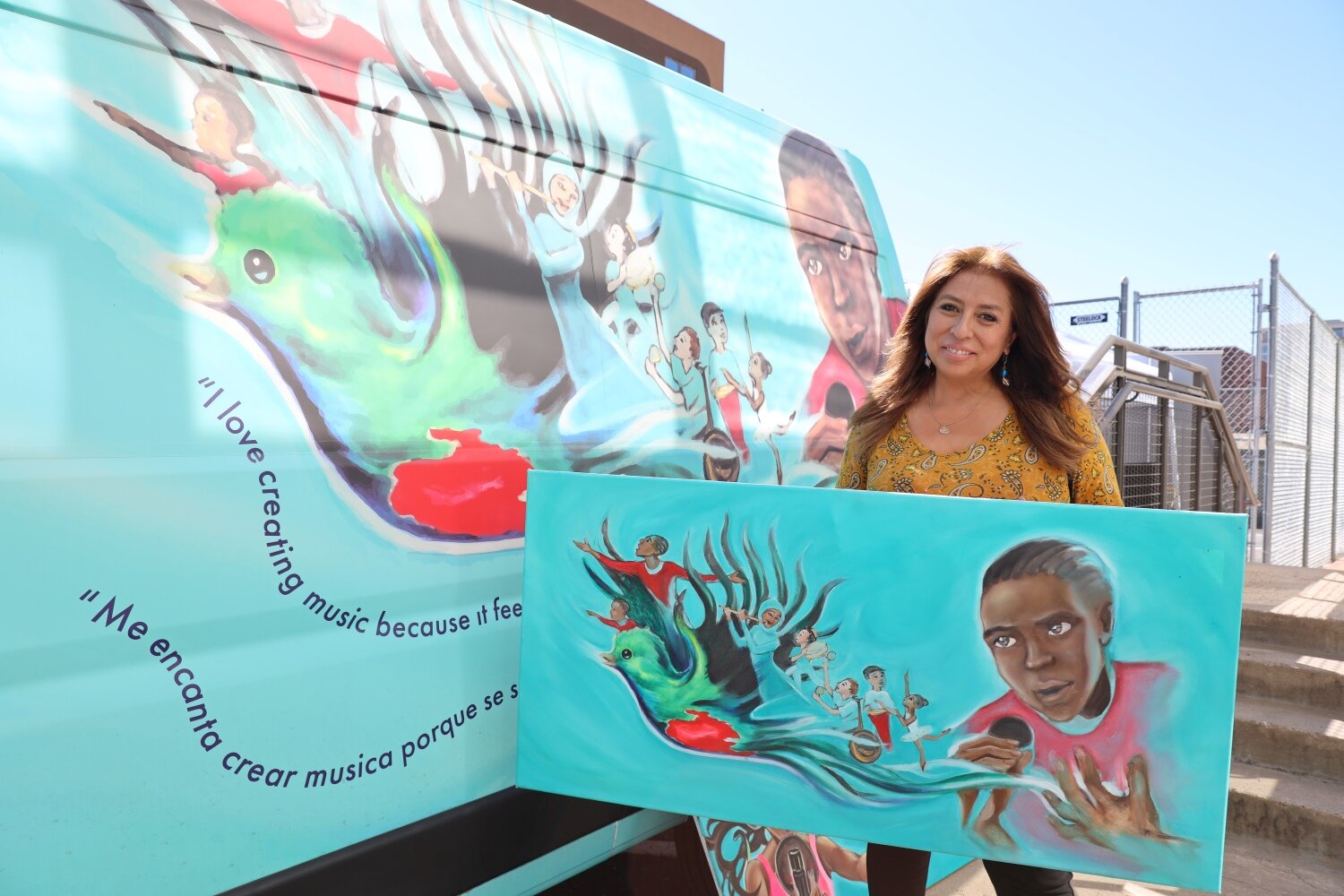Mobile recording studio helps students find their voice

DENVER — Messiah slips on a pair of headphones and steps up to the microphone. An audio engineer sits at the sound board. The engineer presses a button, and a catchy hip-hop beat begins to reverberate through the nearby speakers.
Messiah, 15, didn’t pay to reserve a recording studio. He was in the back parking lot of his high school, rapping into a microphone that was set up that afternoon.
Mobile Studio Incorporated is a Denver-based nonprofit that brings professional studio recording equipment to public school campuses like Messiah’s.
Mobile Studio’s founder, Oren Bregman, discovered a passion for music through mentors at his local teen center in Michigan. The studio is Bregman’s way of bringing the teen center directly to students, making it easier for them to access the resources he found so valuable at that age.
The organization specifically focuses on serving public schools designated as “pathways schools,” which are designed to help students who are at a greater risk of not graduating.
Bregman connected with a childhood friend, Etamar Prizament, who works as a social worker at Contemporary Learning Academy, a pathways school in downtown Denver.
Prizament saw the value the Mobile Studio could bring to students, and with that, Bregman’s mission to connect more students with music was underway.
“We felt like there was an explicit need for us to be here,” Bregman said. “And we became part of that infrastructure to help the students get to where they need to go.”
That infrastructure includes an on-site food pantry, clothing boutique and financial and career advising. All are free to students.
Mobile Studio is designed to give students an outlet to express themselves while also teaching them the skills they’ll need to be successful in the music industry, if that's where their dreams take them.
“They all have a tremendous gift and unique experiences that I want them to share,” Bregman said about the students. “It can be healing. I've seen students use a creative outlet, and not only are they able to have a platform now to tell their story and express themselves, but now it's sort of like they're empowering themselves through music.”

Students like sophomore Messiah learn many aspects of music production, from recording lyrics to mixing the final audio track.
Messiah, a sophomore at CLA, has been using the studio for about a year. He tries to come every time the studio is on campus. Messiah, who releases music under the name Big Gabrazy, sees himself doing music full time after high school.
Messiah has recording equipment at his house, but he likes that the studio gives him a different place to create. Many of his friends want to make music but don’t have access to their own equipment, so the studio helps them make that happen.
“Them having the equipment that could just pull up on you at school, it's definitely a big help,” Messiah said.
Messiah said the studio also gives students another option when deciding how to spend their day after school.
“I know it keeps people out of doing trouble,” Messiah said. “If you in here making music, you can't be out there doing nothing else."
When the final bell rings to let students out of school, Bregman makes an announcement over the intercom, encouraging students to come use the studio. Co-executive director Jeff Grady — the other half of the Mobile Studio team — is waiting at the studio, ready to greet students as they come trickling out.
“When high schoolers get out of school, they have five seconds to decide what they want to do with the rest of their day,” Grady said. “We're trying to create a great program for them to hang out after school, a place where they can express themselves, a place where they can let their voice be heard, a place where they can share their talent with their friends and family.”
Grady, who has a background teaching music production in Colorado Springs, joined Mobile Studio three months ago. Like Bregman, he valued the access he had to music at a young age and wants to pay that opportunity forward to the next generation of artists.
Before Grady joined, Bregman ran the studio on his own for three years. Bregman leveraged his connections in the music industry to kickstart the organization. When he was 18 years old, Bregman signed at P.G.F.A/Traxside Recording Studios in Michigan. They helped Bregman fundraise and get the initial equipment for the studio.
The studio includes two microphones, an audio mixing board and two laptops. Students who aren’t at the microphone can act as the audio engineer. Grady said students usually start off as engineers, and after a few visits, they want to step up to the microphone and share their voice.
“When students start, they might be a little shy to get on the microphone and not really know what to say. But after a week or two, students become comfortable,” Grady said. “We're really breaking down all kinds of barriers, and they're feeling safe to share their stories.”
Bregman and Grady set up the studio in the parking lot behind the school. At the beginning of the school year, the studio usually draws six to eight students. As the year goes on and they build trust with the students, Bregman said that number can grow to about 20 students hanging out at the studio.
The goal is to create a space for students to collaborate and build confidence as they work through the creative process.
“Sometimes sharing a message can be awkward,” Grady said. “Music helps us share messages through creative ways that are exciting.”
Related Video
Artist Leticia Cristal Darlina Tanguma designed the van's art to represent the freedom of musical expression.
The mobile part of Mobile Studio wouldn’t be possible without the organization’s van, which transports the equipment necessary for the studio. The van, parked next to the studio, is also the backdrop for the recording sessions. Leticia Cristal Darlina Tanguma designed that backdrop.
“I truly wish that when people see the art that I create, especially that I create with or for the community, I hope they are inspired somehow to express their own voices,” Tanguma said.
Tanguma answered a call for submissions to design the van’s exterior. Tanguma is a member of the Reach Core Artist program at Denver’s Red Line Contemporary Art Gallery. Growing up, she used music to cope with her mother’s cancer, and she resonated with the organization’s mission to connect young people with music.
“I'm like, wow, this actually brings music to youth who may be also using music to deal with whatever they're going through, but also to express themselves,” Tanguma said about the organization. “I wanted to show some kind of freedom of being able to do that.”
Tanguma created three oil paintings that were photographed and translated into vinyl wrapping for the van. Each side of the van, including the back, shows a different painting.
The paintings feature a diverse community of musicians, many of them inspired by people in Tanguma’s life. Most of the musicians are riding on the backs of hummingbirds, soaring upward.
“On museum walls we're not used to seeing people of color. So, this is amazing that when you're driving down the street, you could see a gallery on wheels,” Tanguma said. “I'm hoping when this van goes to schools like this, that the youth that they work with will see themselves also reflected in the art as they create music and jam.”
Bregman started Mobile Studio in the summer of 2020. Since then, he’s acquired more studio equipment and brought on his first staff member, Grady. He’s created partnerships with more schools in the Denver area, including AUL Denver and Florence Crittenton. Bregman and Grady try to bring the studio to a school every day, sometimes going to two schools in one day.
Bregman and Grady want to grow their organization’s reach without sacrificing the time and energy they can put into each student. To do that, they’re going to need to get more music educators on board.
“We see this as a potential model that could be taken across the whole country,” Grady said. “We'd like to have a second van soon. We'd like to have a whole fleet of vans in the next few years. We'd like to work with artists and producers all over the country who are capable of teaching at this level and bringing this program.”
The most important piece of the program is the students, whose energy and creativity make the studio sing.
“When it started, it was just an idea, just a dream, a glint in the eye,” Bregman said. “We have students that are coming back year after year and you see the growth. And I'm most excited about that. I want to thank them for being a part of this beautiful mission.”
Carly Rose is the journalism intern at Rocky Mountain PBS and can be reached at carlyrose@rmpbs.org.
Julio Sandoval is a senior photojournalist at Rocky Mountain PBS and can be reached at juliosandoval@rmpbs.org.

